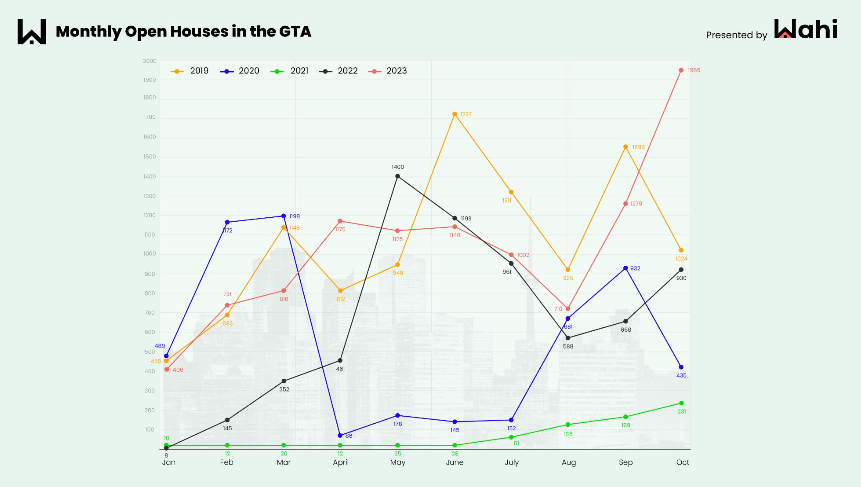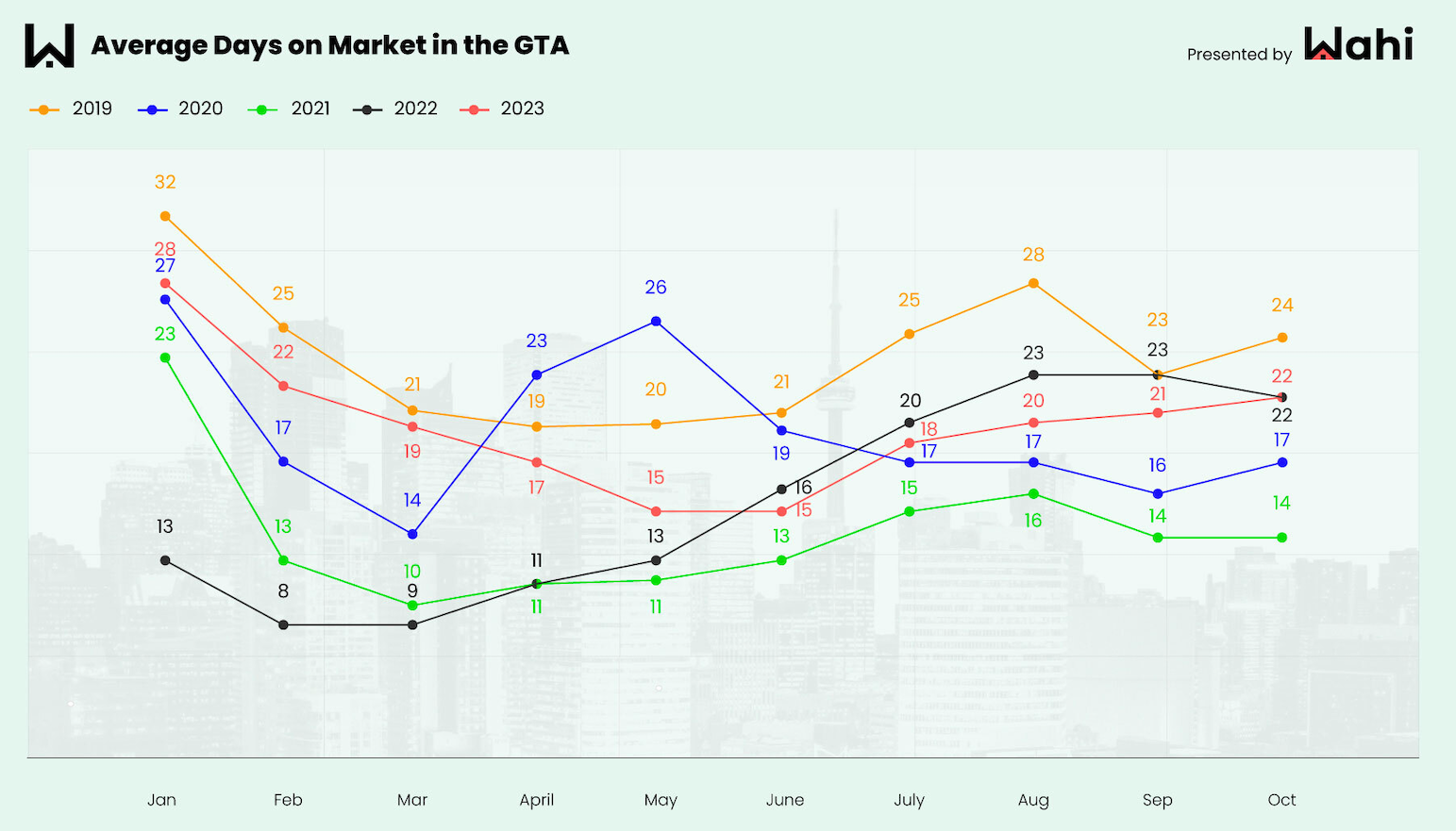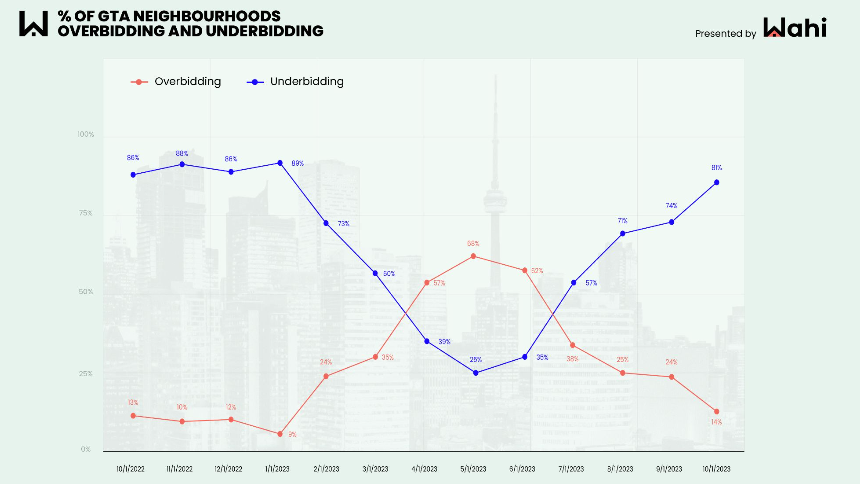Getting a handle on where the current market is headed is like trying to nail jelly to a wall – pretty much impossible. There’s a barometer that you may not have factored in though: open houses.
Open houses reflect market conditions, although not always in the ways we think. Take the question of whether more open houses are being held than usual, or less.
October open houses in the GTA: Record month since 2019
As it turns out, the answer right now is more – many more. At least, that’s the case in the Greater Toronto Area (GTA) according to Wahi, a digital real estate platform that’s begun expanding across Canada. The same is true for other major centres like Vancouver, according to recent Royal LePage stats.
There has been a huge spike in open house activity in the GTA recently, notes Benjy Katchen, Wahi’s CEO.
“There were 1,965 open houses across the GTA in October, making it the biggest month since at least 2019 in any month through all periods,” says Katchen. “In October 2022 there were 930, so it’s more than double that now.”
It’s also almost double October 2019’s pre-covid numbers, before everything was knocked sideways. This past September’s stats were way up as well.

All told it’s been a phenomenally busy fall for open house activity. What’s that about?
GTA open houses return amid buyers’ market
“The open house is back, I’d say,” asserts Katchen.
You’d think that’s a good sign. And it can be, but Katchen explains that this surge – along with the fact that “we’re in underbidding territory” in a whopping 81 per cent of GTA neighbourhoods, according to Wahi’s research – may be early signs that the market is starting to shift and fray.
Surprisingly, days-on-market statistics, another gauge of activity, is holding fairly steady – in the low 20s. “But I bet that will start to go up,” predicts Katchen. “It’s a funny market.”

As the trend of homebuyers purchasing for under-asking continues to ramp up, sellers aren’t getting the numbers they want anymore. “We’re seeing a bit of a cooling off,” notes Katchen.
“The top underbidding neighbourhoods this year have tended to be more expensive, while the top overbidding neighbourhoods have comparatively lower list prices,” he adds.

An indicator of selling issues and market shifts
The reality is that increased levels of open house activity can be an indicator that people are having trouble selling. When this happens, Katchen explains, more listings get terminated and properties re-listed, which can skew the days-on-market numbers. This makes them look better than they actually are.
There are other dynamics at play as well.
The tilt from seller’s to buyer’s market can impact open house numbers, as sellers and their agents increasingly feel pressure “to put their best foot forward,” Katchen maintains. A boost in open house numbers may result, as we’re seeing now.
But are the buyers coming?
This doesn’t mean that open houses are a valuable tool in every situation. Some agents will tell you they’re outdated and a waste of time.
Wahi doesn’t collect statistics on the amount of people turning up at open houses. Interestingly, despite the platform’s statistics showing a big jump in open houses, many realtors REM spoke with report that the actual numbers of those coming through seem to be down significantly.
As one agent said, “Nobody shows up…crickets.”
While this isn’t everyone’s experience, it’s become more common. Among the reasons speculated are the challenging market, fewer buyers, interest rates, lack of affordability and the fact that buyers are increasingly using digital tools to weed through listings.
Wide range of realtor perspectives
In a market like this, fresh new listings that show well, are priced right with great curb appeal and are in urban areas with parking attract the most traffic. Decent weather doesn’t hurt either.
Dwelling type isn’t as important, at least in Katchen’s opinion. June and September are traditionally the biggest months for open houses, he adds, and weekends of course tend to be the days of choice.
The reasons agents hold open houses – or don’t – are as varied as the ways that open house activity can be an indicator of market conditions. Many agents, especially new ones, say they use open houses as a farming tool for lead generation. Even when this doesn’t result in clients, “it allows them to have conversations and get the soft skills practice that’s so important,” points out Sue Anfang, an agent with Keller Williams in Toronto.
With a long time in the business, Anfang says she continues to pick up qualified leads and see reasonable activity through her open houses, especially in popular Toronto neighbourhoods like Leslieville and the Beaches.
She doesn’t even mind when nosy neighbours inevitably turn up. “I do occasionally get clients that way,” she maintains.
A big reason agents do open houses is to appease clients, to show them that no stone is left unturned. “It’s a good way to demonstrate that you’re doing everything you can to sell the property,” Anfang points out.
The bottom line
At the end of the day, most sellers want open houses, and the exposure is worth it.
“At an open house, I can engage with the public and sell the house, the neighbourhood and myself. It’s face-to-face marketing. I get lots of good leads,” says Karina Sadu of Real Estate Homeward in Toronto.
“I don’t find them a waste of time at all. I think open houses are really valuable.”
Susan Doran is a Toronto-based freelance writer who has been contributing to REM since its very first issue.














Open houses are a lead generation opportunity for the listing agent and ensuring Sellers are informed of this fact is imperative today.
Pretending they assist in selling a home is a problem because study after study have proven this to be false.
Being honest with a Seller from day one of contact through the day keys are handed over builds trust, the trust needed to get a price reduction which is the only data driven selling tool available.
Yes desperate Sellers will still allow you to hold an open house even after you disclose that you are doing it with the sole purpose of meeting unrepresentative Buyers.
Of desperate sellers are the ones who need the power of truth the most as the trust to get a needed reduction is always high
It’s a counter-indicator
Down is up and like that